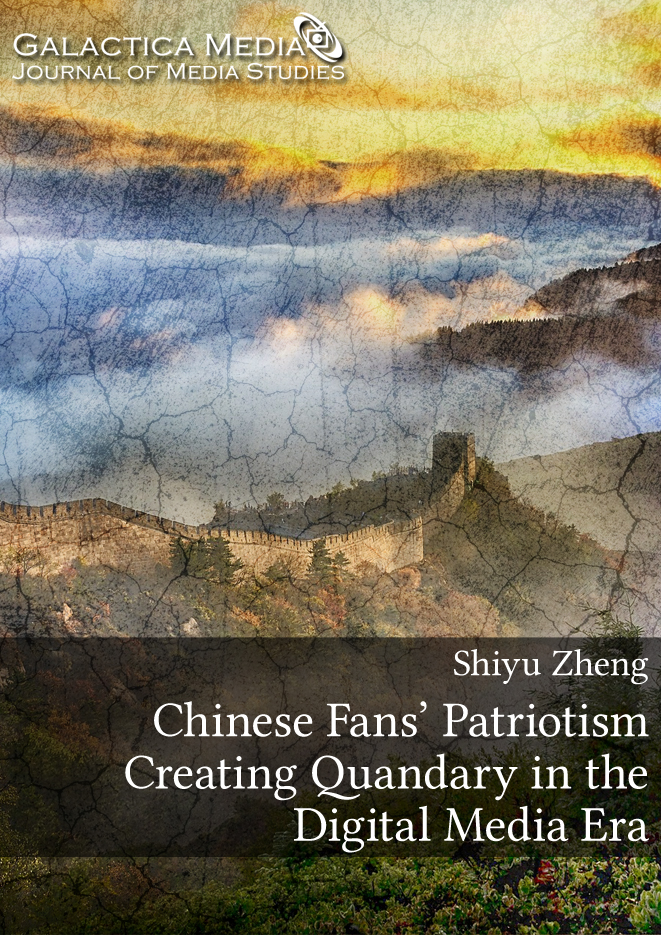Abstract
China is considered to be a nation with the largest number of netizens and online fandom throughout the world. The power of netizens cannot be overlooked, particularly with regard to the digital mobilization of nationalism. In a recent event regarding a geographic map controversy spawned by the TV series of “Go Go Squid!” many netizens became fan patriots and activists for territorial integrity. This TV series caused tremendous resistance due to its showing an incomplete Map of China in one of its episodes on 31st July 2019. This research deploys three research methods of netnography (digital scraping of fan expression), a qualitative interview and commentary analysis to examine fans’ engagement upon this sensitive issue in China. The fans of the series and its main character naturally divided into different groups to show their opposing standpoints. With the help of Chinese featured cyberspace, Chinese netizens were hierarchically grouped as either loyal fans of the series, general/ordinary fans of the actress, or fan patriots and fan activists of the nation. Ambivalent attitudes from state media intensified the debates to call for a much more robust mechanism to guide cyber fandom.
References
Anderson, B. (1991). Imagined communities: Reflections on the origin and spread of nationalism. London: Verso.
Bennett, L. (2012). Fan activism for social mobilization: A critical review of the literature. Transformative Works and Cultures, (10), 15. Doi: 10.3983/twc.2012.0346.
Chin, B., & Morimoto, L. (2013). Towards a theory of transcultural fandom. Participations: Journal of Audience and Reception Studies, 10(1), 92-108.
China Youth Daily. (2019). More than one problem on the map of China in the Go Go Squid!. Retrieved from https://news.sina.com.cn/c/2019-08-02/doc-ihytcerm7970022.shtml
Chinese nationalism used to be aimed at both domestic and foreign audiences. Not anymore (26 May 2020). The Diplomat. Retrieved from https://thediplomat.com/2020/05/how-chinese-nationalism-is-changing/
Click, M. (Ed.). (2019). Anti-Fandom: Dislike and Hate in the Digital Age. NYU Press.
CNNIC (Chinese Network Internet Information Centre) (2019, September). Survey Report of the Chinese Internet. Retrieved from: http://www.cnnic.net/hlwfzyj/hlwxzbg/hlwtjbg/201608/P020160803367337470363.pdf
Coenders, M., Gijsberts, M. & Scheepers, P. (2017). Chauvinism and patriotism in 22 countries. In Nationalism and exclusion of migrants (pp. 29-69). Routledge.
Duara, P. (1993, July). De- constructing the Chinese nation. The Australian Journal of Chinese Affairs, (30), 1–26. Doi: 10.2307/2949990
Esarey, A., & Xiao, Q. (2011). Digital communication and political change in China. International Journal of Communication, 5, 22.
Fairbrother, G. P. (2004). Patriotic education in a Chinese middle school. In Citizenship education in Asia and the pacific (pp. 157-174). Springer, Dordrecht.
Fiske, J. (1992). The cultural economy of fandom. In Lisa A. Lewis (Ed.) The adoring audience: Fan culture and popular media (pp. 30-49). Psychology Press.
Greenfeld, L. (1992). Nationalism: five roads to modernity. Harvard University Press, Cambridge, MA.
Hailong, L. (Ed.). (2019). From cyber-nationalism to fandom nationalism: The case of Diba expedition in China. Routledge.
Han, R. (2019). Patriotism without state blessing: Chinese cyber nationalists in a predicament. In Handbook of Protest and Resistance in China. Edward Elgar Publishing.
Hills, M. (2003). Fan cultures. London: Routledge.
Jenkins, H. (1992). Textual poachers: Television fans and participatory culture. Routledge.
Jenkins, H., & Shresthova, S. (2012). Up, up, and away! The power and potential of fan activism. Transformative Works and Cultures, (10), 1-5. Doi: 10.3983/twc.2012.0435.
Kligler-Vilenchik, N., McVeigh-Schultz, J., Weitbrecht, C., & Tokuhama, C. (2012). Experiencing fan activism: Understanding the power of fan activist organizations through members’ narratives. Transformative Works and Cultures, 10. Doi: 10.3983/twc.2012.0322.
Li, H. (2019). Understanding Chinese nationalism. In Hailong, L. (Ed.), From Cyber-nationalism to Fandom Nationalism: The Case of Diba Expedition in China (pp. 13-31). London: Routledge.
Liu, (2019). Collective action as interaction ritual in cyberspace. Hailong, L. ed., 2019. From Cyber-nationalism to Fandom Nationalism: The Case of Diba Expedition in China. pp. 93-108. London: Routledge.
Osnos, E. (2008, July 8). Angry youth: The new generation’s neocon nationalists. 8th July, 2008. The New Yorker.
Pels, D. (2003). Aesthetic representation and political style: Re- balancing identity and difference in media democracy. In J. Corner & D. Pels (Eds.), Media and the restyling of politics: Consumerism, celebrity and cynicism (pp. 41– 66). London: Sage.
Qiang, X. (2011). Liberation Technology: The Battle for the Chinese Internet. Journal of Democracy, 22(2), 47-61. Doi: 10.1353/jod.2011.0020
Sandvoss, C. & Kearns, L. (2018). From interpretive communities to interpretative fairs: ordinary fandom, textual selection and digital media. In Reijnders, S., Zwaan, K. and Duits, L. (Eds.), The Ashgate research companion to fan cultures (pp.91-108). Farnham: Ashgate Publishing, Ltd.
Song, Q, Zhang, C., Qiao, B., Tang, Z. & Gu, Q. (1996). China Can Say No. (中国可以说不.) Beijing, China: Zhongguo Gongshanglian Chubanshe. (In Chinese)
Wong, B. (2020). How Chinese Nationalism Is Changing. Retrieved from https://thediplomat.com/2020/05/how-chinese-nationalism-is-changing/
Wu, J., Li, S., & Wang, H. (2019). From Fans to “Little Pink”: The production and mobilization mechanism of national identity under new media commercial culture. In Hailong, L. (Ed.)? From Cyber-nationalism to Fandom Nationalism: The Case of Diba Expedition in China (pp. 32-52). London: Routledge.
Yang, G. (2009). The power of the internet in China: Citizen activism online. New York, NY: Columbia University Press.
Yang, G. (2019). Performing cyber-nationalism in twenty-first-century China: The case of Diba Expedition. In From Cyber-Nationalism to Fandom Nationalism (pp. 1-12). Routledge.
Zhang, W., & Mao, C. (2013). Fan activism sustained and challenged: participatory culture in Chinese online translation communities. Chinese Journal of Communication, 6(1), 45-61. Doi: 10.1080/17544750.2013.753499.
Zhao, S. (1998). A state-led nationalism: The patriotic education campaign in post-Tiananmen China. Communist and Post-Communist Studies, 31(3), 287-302. Doi: 10.1016/S0967-067X(98)00009-9
Zhao, S. (2004). A nation-state by construction: Dynamics of modern Chinese nationalism. Stanford University Press.
Zhu, H., Shan X., & Hu., J. (2009). "2009 China Internet Public Opinion Analysis Report," in Chinese Academy of Social Sciences, "2010 Society Blue Paper," 22 December 2009.

This work is licensed under a Creative Commons Attribution 4.0 International License.


